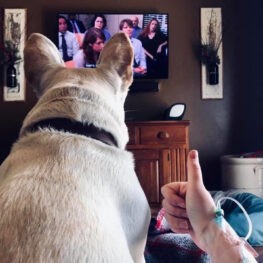Growing up is tough. From learning to drive, applying to colleges, and learning to manage your finances, transitioning to adulthood holds its own challenges for everyone. Paired with the added complication of having a rare disease, these young adults are faced with unique obstacles in their journey towards independence from their parents and caregivers.
We spoke with Annika and Maddy, two young adults with rare diseases, to learn more about their journey of transitioning into adulthood. As they reflect on their experiences of growing up rare, Annika and Maddy begin to uncover some tips and resources to make growing with your disease, and doing it in the time of COVID-19, a little easier.
Taking the Long Way Around
Annika Lacroze was a straight-A student in high school, with ambitions of attending college and becoming a doctor, when an unexpected flare-up of autoimmune encephalitis her junior year of high school put a hiccup in those plans. She recalls “I was out of school for six months, and when I came back to school, not only was it difficult to catch up on schoolwork, but I had a hard time remembering things like my friend’s names and what classes I was in.”
Encephalitis is a rare disease causing inflammation of the brain, and while it can be managed with steroids and IVIG treatments, Annika admits that “I struggled in college because I had a significant amount of information to retain, which isn’t possible for me because of encephalitis… The hardest part is knowing that from now on, I’ll have to work twice as hard as somebody else to get the same result.” While Annika’s encephalitis may have slowed her down, her ambition is as strong as ever.
“After I got sick for the first time, I knew I wanted to work in medicine. I became an EMT when I was still in high school as a 17 year old… And while there’s always a slight scare in the back of my mind that I could get sick again, it’s something that I love so much that I’m not willing to let my disease define me.”
Annika Lacroze
When applying for colleges, Annika needed to stay close to home and choose a school that was near a hospital equipped to continue her treatments, which she received 1-3 times a month.
These treatments are costly, rarely covered by insurance, and can be up to 14 hours long, requiring Annika to “sometimes have to miss exams or negotiate with teachers to make sure I was staying on top of my schooling and my disease.”
While maintaining a balance of social and school schedules can be difficult for any college student, navigating the complex world of health insurance and medical treatments doesn’t come with a syllabus.
Finding a Community

Maddy speaks at World Encephalitis Day Conference in 2020
Similarly, fellow Hashimoto’s Encephalopathy SREAT Alliance (HESA) member Maddy Bohme recalls how she and Annika first became friends. Maddy became inspired to join HESA after her own experience with hashimoto’s encephalopathy, saying “after what I went through, I felt passionate about helping others with this disease. I also felt very fortunate that I was diagnosed and treated for it, because there are others who have not been… I feel a responsibility to be a voice for these people.”
Maddy is acutely aware of her position as an immunocompromised or “high-risk” individual. “With something like a virus, my medications don’t leave me very well prepared to fight it off,” she says. “This has me concerned and very cautious right now because I definitely don’t want to test the waters when it comes to my health.”
Maddy’s condition, like Annika’s, flares up whenever she gets something as simple as the flu, causing her to become “double sick,” with both an HE flare-up and the flu.

“I feel lucky that I am able to receive at-home transfusions.”
Despite this fear, Maddy feels “lucky that I am able to receive at-home transfusions and live at home with my parents at this time where many other people with my disease don’t have as many resources as I do.”
So, What Now?
Like all of us, Annika and Maddy’s lives have been put on hold. Uniquely, the journey of adjusting their lives to accommodate their health needs doesn’t stop once the coronavirus has passed. However, through finding the support of a community and keeping an unrelenting eye towards the future, these two continue to redefine what it means to be young and rare.

Stay Connected
Sign up for updates straight to your inbox.
